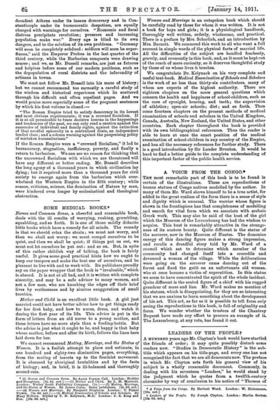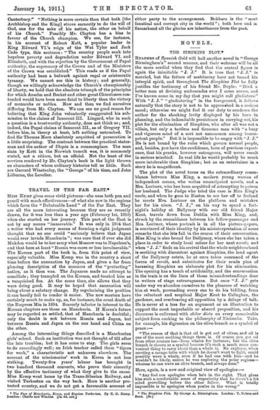LEADERS OF THE PEOPLE.t
A HUNDRED years ago Mr. Clayton's book would have startled the friends of order ; it may quite possibly disturb some readers now. "Studies in Democratic History" is the sub. title which appears on his title-page, and every one has not recognised the fact that we are all democrats now. The preface in which Mr. Clayton sets forth his general view of his subject is a wholly reasonable document. Commonly, in dealing with his seventeen "Leaders," he would stand by the judgment which he quotes from a twelfth-century chronicler by way of conclusion to his notice of " Thomas of • A Vows from the Congo. By Herbert Ward. London: W. Heinemaxm, [lee. net.] t Leaders of the People. By Joseph Clayton. London: Martin Seeker. [12a. 6d. net.]
Canterbury." "Nothing is more certain than that both [the Archbishop and the King] strove earnestly to do the will of God, one for the sake of his nation, the other on behalf of his Church." Possibly Mr. Clayton has a bias in favour of the Church champion. We see, for instance, in his account of Robert Kett, a popular leader in King Edward VI's reign of the Wat Tyler and Jack Cade type, this sentence : " The country people sank into hopeless poverty and degradation under Edward VI. and Elizabeth, and with the rejection by the Government of Papal authority, the supremacy of the Crown and of the Ministers of the Crown was established." This reads as if the Papal authority had been a bulwark agiinst regal or aristocratic tyranny. We cannot see this in history; and generally, though we willingly acknowledge the Church's championship of liberty, we hold that the absolute triumph of the principles for which Anselm and Becket and other great Churchmen con- tended would have been more fatal to liberty than the victory of monarchs or nobles. Now and then we find ourselves differing from Mr. Clayton. We can see no good reason for believing that King John voluntarily exaggerated his sub- mission to the claims of Innocent III. Lingard, who in such a question is a trustworthy authority, does not think so ; and, indeed, the Papal claims of Innocent III., as of Gregory VII. before him, in theory at least, left nothing untouched. To find Sir Thomas More absolutely acquitted of persecution is a little surprising. The contrast between the practical states- man and the author of Utopia is a commonplace. The man slain by Kett in the Norwich tumult was, it is commonly stated, not a citizen, but an official. Not the least of the services rendered by Mr. Clayton's book is the light thrown on characters of whom ordinary histories tell us little. Such are Gerrard Winstanley, the " George " of his time, and John Lilburne, the Leveller.







































 Previous page
Previous page